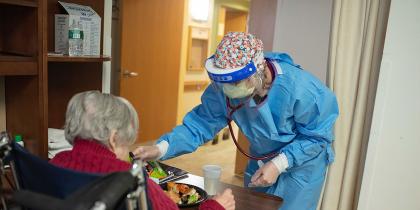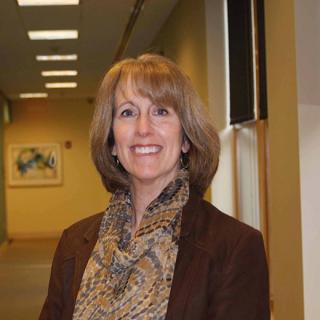Improving Communication for Seniors While Wearing a Mask

The COVID-19 pandemic has presented many challenges to communicating and staying engaged. Wearing a mask has become the “new normal,” not only for health care workers but for everyone navigating life. It’s important to communicate effectively while wearing one.
About half of those ages 75 and older have some level of hearing loss. For people who are deaf or hard of hearing, communicating with a mask on is even harder. As a clinical supervisor in the audiology clinic at Hebrew SeniorLife, many of my patients have told me, and, I have personally witnessed that, hearing another person’s speech becomes harder when they’re wearing a mask.
Solid facemasks and coverings reduce the effectiveness of spoken communication by dampening and filtering sound, degrading speech intelligibility, and removing the visual cues that facilitate comprehension of speech. This makes communication more difficult for everyone, but especially for people with hearing and speech disorders—placing those individuals at a higher risk for adverse medical events, among other negative consequences.
Here are some communication tips when wearing a mask:
- Speak more slowly and enunciate clearly.
- Use hand gestures, when appropriate. This helps add redundancy to your words.
- Try writing your message or drawing pictures.
- Reduce background noise as much as possible when having a conversation. Turn off the TV and close doors and windows.
- If you wear a hearing aid, look for a mask that ties behind your head. Masks with ear loops can dislodge hearing aids.
- Try different types of masks to see what works best for you. Manufacturers are coming up with different types of masks that have clear panels, allowing you to see just a person’s mouth. Just be sure that any mask still provides complete covering of your mouth.
In today’s world, technology is also playing a major role in helping those with hearing impairment. If your vision is adequate, you can use various forms of visual and audio devices to assist in communication.
Here are some helpful tips for technology-assisted devices.
- FaceTime.
If you are using FaceTime, the screen allows the listener to see the person talking. Consider being in a place with more light so the person listening can more easily see their face.
- Zoom or conference calls.
Zoom has become popular for work, family events, and group chats. Depending on the device that’s being used, there are options for the listener. The volume can be adjusted on the viewing device. Zoom has an option where the person talking becomes the primary view on the screen. (i.e, they become the biggest “box” in the group), allowing the viewer to see the speaker’s lips. You can also consider using your cell phone with a wireless Bluetooth speaker, which can be easier to hear.
- Hearing aid users.
For those with Bluetooth enabled hearing aids, there are many options to help hear easier. Cell phone calls can go directly through a hearing aid. Television audio can also be sent to a hearing aid, all wirelessly. Many Bluetooth hearing aid users have an external device, which can be plugged into any audio device, sending the signal directly to hearing aids.
Solid facemasks and coverings reduce the effectiveness of spoken communication by dampening and filtering sound, degrading speech intelligibility, and removing the visual cues that facilitate comprehension of speech. This makes communication more difficult for everyone, but especially for people with hearing and speech disorders—placing those individuals at a higher risk for adverse medical events, among other negative consequences.
Blog Topics
Learn More
Outpatient Services
Our outpatient health care clinics at Hebrew Rehabilitation Center in Boston offer a variety of services, including memory evaluations, osteoporosis screenings, and audiology.




